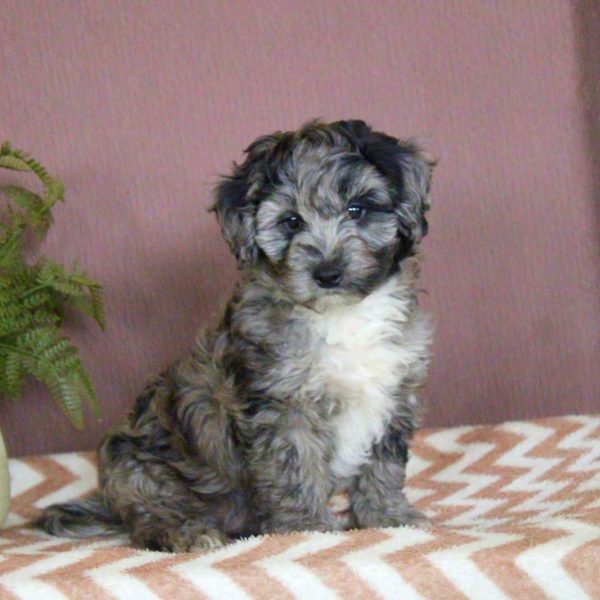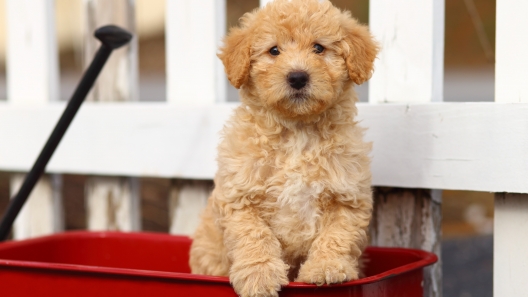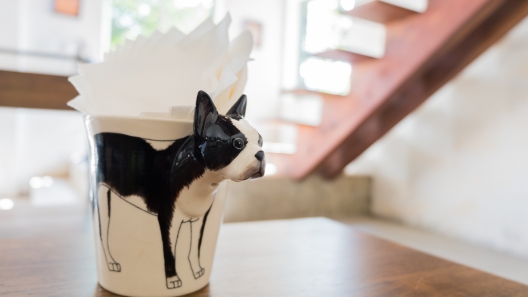
-
Activity Level:
low
-
Shedding Level:
low
-
Grooming Level:
high
-
Trainability:
moderate
-
Good for Novice Owners:
moderate
-
Adaptability:
high
-
Kid/Pet Friendly:
often
-
Prey Drive:
moderate
-
Watchdog:
very alert
- Average Size: Small
- Average Lifespan: 12-15 years
Shorkie-Poo Dog Breed Information
Overview
Temperament
Adaptability
Health
Owner Experience
Grooming
Activity Level
Size
Life Span
Did You Know?
The Shorkie-Poo is a cross between a Shorkie and a Miniature or Toy Poodle. Although a mixed-breed dog can inherit any combination of traits from their parent breeds, a Shorkie-Poo should be a well-balanced, low-shedding family companion that is intelligent, loving, and playful.
Shorkie-Poos are small dogs that can have big personalities. They are affectionate, bond closely with their families, and thrive on attention from them. They love to cuddle and they love the be the center of attention!
As long as they have been properly socialized, they tend to get along well with children, other dogs, other pets, and even strangers. Often, they love having someone else to play with. Because they are so small, especially as puppies, it’s important to closely supervise playtime with children as they can be easily injured by young children who are still mastering motor control.
They are also alert and tend to bark to let you know when something or someone is nearby. Because they are prone to barking, it can also easily become a nuisance behavior if you do not start to train your dog to stop barking early on.
A Shorkie-Poo is a highly adaptable dog breed. They thrive in apartments as well as larger homes with yards. As with any dog breed, they are sensitive to heat. And, because they are so small, they are also sensitive to the cold.
Bundling them up with the right mix of winter dog products when the temperatures start dropping can help keep them warm while out on walks. As a true companion breed that bonds closely with their families, these little dogs do not do well with long periods of time alone and they can be prone to developing separation anxiety.
Although a mixed-breed dog can sometimes be healthier than a purebred dog, it’s not a guarantee and all depends on responsible breeding practices. Just as a mixed-breed dog could inherit none of the conditions common to their parent breeds, they could also inherit all of them or any combination of them.
In the Shorkie-Poo, potential health conditions to be aware of include luxating patella, allergies to certain medications, sensitivity to anesthesia, kidney stones, liver disease, hypoglycemia, progressive retinal atrophy, and collapsed trachea.
Reputable breeders will screen their dogs before breeding to avoid passing preventable issues on to puppies. So, make sure you are asking about the health and genetic history of both of the parents. You can also ask about any health tests or clearances that have been done.
Shorkie-Poos are moderately trainable dog breeds. Although they are intelligent, eager to please, and pick up on things quickly, they can also be stubborn at times. They may also attempt to push boundaries at times, which makes consistent and clear signals during training even more important.
They do tend to be a good fit for owners of any experience level. However, first-time owners can find them challenging at times, so puppy training classes are recommended. These classes can help you strengthen the bond you have with your puppy, reinforce training, and also provide some opportunities to socialize a puppy.
A Shorkie-Poo could end up with a short or a longer coat that ranges from curly to silky. Regardless of coat type, it will be low-shedding, require daily brushing to remove tangles, the occasional bath, and a trip to the groomer every 4-6 weeks to maintain the clip.
In addition to coat care, you will also need to take care of your Shorkie-Poo’s nails, ears, and teeth. There will be some overlap with visits to the groomer, so they may be able to take care of some of this during the visit. But, you will still need to do your own maintenance and care at home between appointments.
Cutting nails once or twice a month is usually frequent enough to keep your dog’s nails from growing too long. Weekly checks and careful ear cleanings as needed can help prevent ear infections. Daily tooth brushing or use of an enzyme toothpaste in addition to cleanings at the vet when needed are ideal elements of good dental care for dogs and helps prevent dental disease later in life.
Even though they may be energetic at times and have bursts of energy while playing, Shorkie-Poos tend to sit in a lower activity range. Daily walks plus some playtime are usually plenty for this small pup.
A fully-grown Shorkie-Poo usually stands 6-14 inches tall and weighs 7-15 pounds.
Shorkie-Poos generally live for 12-15 years on average.
Because a Shorkie-Poo is a cross between a designer breed and a purebred dog, they will have bloodlines from a Shih Tzu, Yorkshire Terrier, and Poodle.







